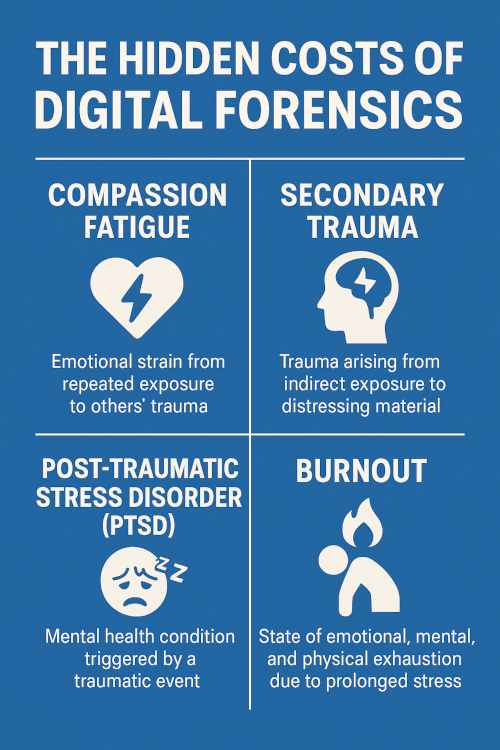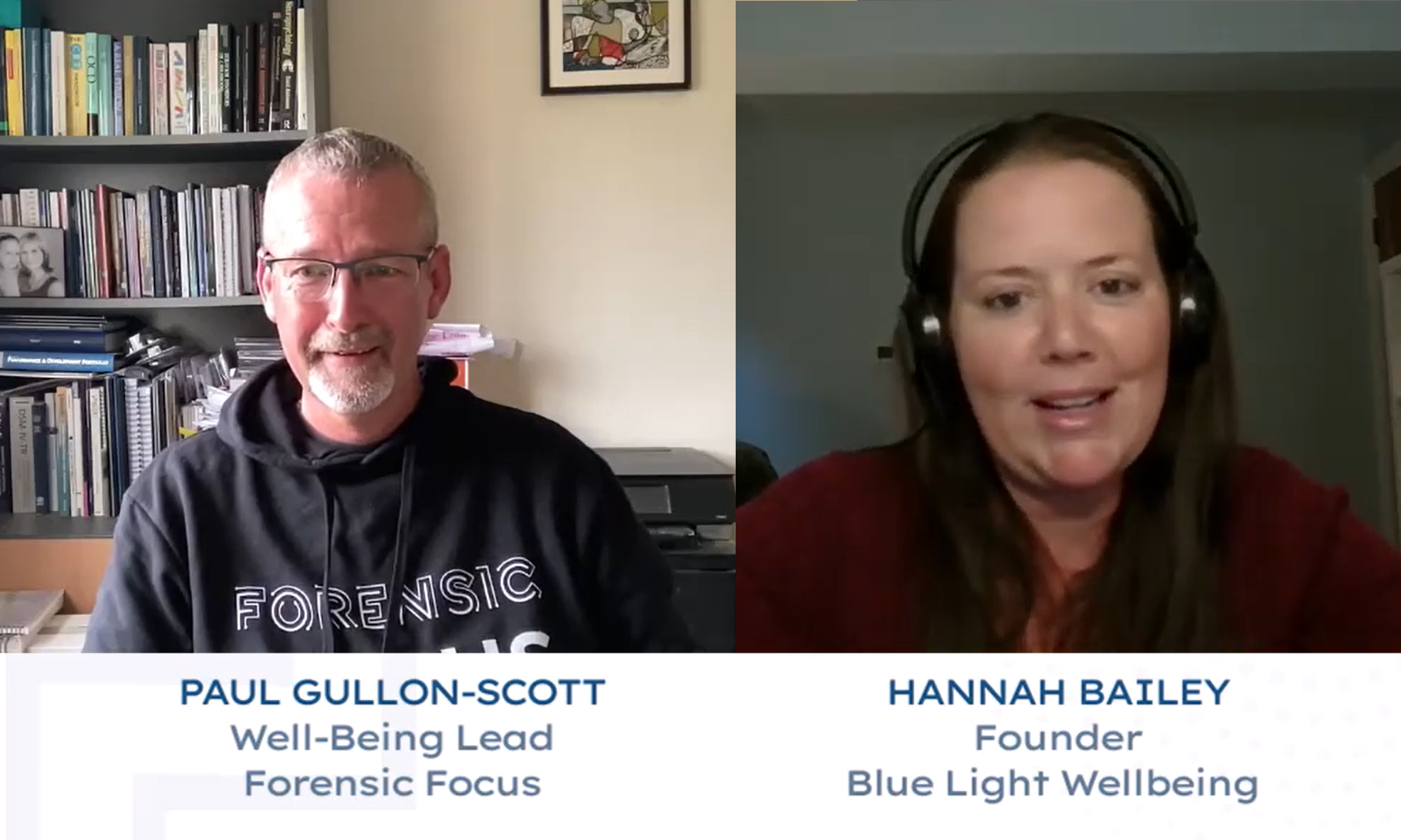By Paul Gullon-Scott BSc, MA, MSc, MSc, FMBPsS
In an era where the psychological toll of public service is becoming more visible, particularly among Digital Forensic Investigators (DFIs), voices like Hannah’s are both powerful and necessary. After facing burnout, PTSD, and cancer during fifteen years as a police officer, Hannah has transformed her journey of healing into a mission to support others on the frontlines. Through Blue Light Wellbeing, she provides trauma-informed therapy and coaching tailored to the unique needs of those working in high-stress, emotionally taxing environments.
This article explores Hannah’s journey, the services she offers, and how her professional insight rooted in personal experience makes her a culturally competent and transformative presence for DFIs facing the hidden costs of their critical work.
A Journey Forged in Service and Adversity
Hannah served as a police officer with West Midlands Police for fifteen years. During that time, she witnessed the very worst of human behaviour, the immense pressure of life-threatening decisions, and the all-too-familiar undercurrent of organisational stoicism that often prevents open discussion of mental health. Like many who serve in emergency services, she learned to suppress emotional responses and carry on despite accumulating trauma.
However, the cost of that suppression eventually made itself known. Hannah’s career culminated in severe burnout and post-traumatic stress disorder (PTSD). As if the mental toll wasn’t enough, she was later diagnosed with cancer, a turning point that prompted deep reflection about her health, purpose, and identity. Her personal crisis would ultimately become the catalyst for a new professional chapter, one rooted in empathy, empowerment, and cultural awareness.
Retraining and Rebuilding: From Police Officer to Trauma Practitioner
Following her departure from policing in 2013, Hannah undertook extensive training in psychotherapy and trauma-informed practices. She completed a Level 7 Diploma in Trauma Therapy, specialising in Emotional Freedom Techniques (EFT) and trauma-focused cognitive behavioural therapy (CBT). She became an advanced practitioner in Brain Working Recursive Therapy (BWRT), an innovative technique that targets maladaptive emotional responses without requiring clients to re-experience traumatic memories.
In addition, Hannah trained as an accredited well-being coach and continues to engage in professional development to ensure her services meet the evolving needs of emergency personnel. This blend of lived experience and clinical competence is rare, and it’s what distinguishes Hannah’s work from more generic mental health services.
The Cultural Competence DFIs Deserve
One of the biggest barriers to effective mental health support for DFIs is the lack of cultural understanding within mainstream services. Digital forensic work often involves prolonged exposure to Child Sexual Abuse Material (CSAM), extreme violence, and disturbing content, all within a bureaucratic system that frequently undervalues emotional resilience.
Secondary trauma is a significant risk for forensic computer analysts, reflecting the wider mental health challenges faced by DFIs. This reality highlights the importance of culturally sensitive, profession-specific mental health support—an approach central to Hannah’s work.

Traditional therapy models may fail to address the specific trauma that DFIs experience. For example, therapists unfamiliar with policing culture may inadvertently minimise the impact of exposure to CSAM, or misunderstand the guilt and shame that investigators carry. Furthermore, the stigma within digital forensics, where asking for help may be perceived as weakness, can deter individuals from engaging in therapeutic services.
Empathy, compassion fatigue, and burnout are common risks for professionals who work on sexual offence cases. DFIs face similar challenges, making it essential that therapeutic support comes from professionals who understand both the operational demands and the emotional impact of working with distressing material.
Hannah, having worn the uniform herself, breaks down those barriers. She doesn’t just understand trauma clinically; she has felt it, lived with it, and overcome it. Her cultural fluency allows her to build trust quickly with clients from the emergency services, who may otherwise be reluctant to open up.
Services Designed with Real-World Trauma in Mind
At Blue Light Wellbeing, Hannah offers a suite of services including:
- Trauma-Informed Therapy
- Well-being Coaching
- Training and Workshops
- Motivational Speaking
These services are specifically designed to address the emotional realities of DFIs, supporting them in healing, coping, and thriving.
The Relevance for DFIs
Digital forensic investigators are often the unseen casualties in the chain of justice. They spend countless hours reviewing evidence that others are shielded from, such as graphic imagery, video footage, and metadata linked to severe abuse. While safeguarding others, they often internalise trauma with little to no formal support.
The term compassion fatigue describes the emotional and psychological strain that can occur when repeatedly exposed to others’ trauma. For DFIs, regularly encountering disturbing digital material, such as CSAM, can trigger symptoms often associated with direct trauma.
Post-traumatic stress disorder (PTSD) can arise from a variety of causes, and effective treatments depend on understanding these origins. The trauma-related symptoms experienced by DFIs underline the value of trauma-informed approaches in therapy, such as those provided by Hannah.
Hannah’s trauma-informed practice is particularly well-suited to DFIs. Her understanding of the psychological mechanisms behind secondary trauma hypervigilance, emotional numbing, guilt, nightmares, and burnout allows her to provide nuanced, compassionate care.
Police Care UK provided empirical data on trauma prevalence within UK policing. The report highlights how systemic factors, including underfunding, cultural stigma, and insufficient therapeutic provision, discussed by Hannah on the Forensic Focus Podcast, exacerbate mental health issues among frontline workers paralleling the experience of DFIs.
Importantly, her work also reflects an awareness of the organisational challenges DFIs face, including chronic under-resourcing, unrealistic performance expectations, and a workplace culture that may reward emotional suppression over emotional wellbeing.
A Model for Systemic Change
Hannah’s practice also offers a model for what systemic wellbeing could look like in the world of digital forensics. Her emphasis on early intervention, culturally competent care, and proactive resilience training is exactly what is needed in environments where trauma is an inevitable occupational hazard.
Employers often limit therapeutic support to six sessions, a model wholly inadequate for the depth of trauma experienced in digital forensic work. Hannah’s flexible, needs-led services represent a more ethical and effective alternative. She champions the idea that those who protect others should be protected themselves.
Final Thoughts
Hannah’s journey from burned-out officer to trauma therapist is more than inspirational; it’s a roadmap for cultural reform. Her story challenges the silence that surrounds mental health in digital forensics and offers real solutions for those who are silently suffering.
By grounding her services in both clinical skill and lived experience, Hannah has become a vital asset to those working in the shadows of justice. Digital forensic investigators deserve to be seen, supported, and understood. In Hannah, they find not just a therapist, but a fellow traveller one who knows their path, honors their sacrifice, and walks beside them on the road to healing. Hannah can be contacted through the Blue Light Wellbeing website.
Paul Gullon-Scott BSc MA MSc MSc FMBPSS is a former Digital Forensic Investigator with nearly 30 years of service at Northumbria Police in the UK, specializing in child abuse cases. As a recognized expert on the mental health impacts of digital forensic work, Paul now works as a Higher Assistant Psychologist at Roseberry Park Hospital in Middlesbrough and is the developer of a pioneering well-being framework to support digital forensics investigators facing job-related stress. He recently published the research paper “UK-based Digital Forensic Investigators and the Impact of Exposure to Traumatic Material” and has chosen to collaborate with Forensic Focus in order to raise awareness of the mental health effects associated with digital forensics. Paul can be contacted in confidence via LinkedIn.







